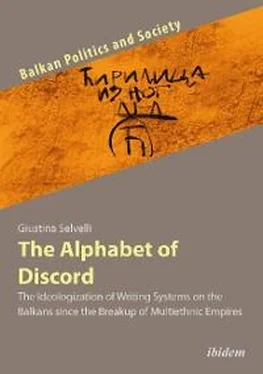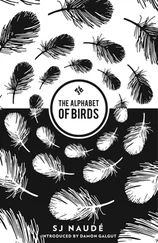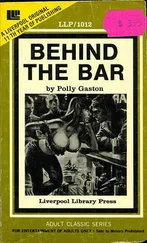ibidem-Press, Stuttgart
Contents
PREFACE
ILLUSTRATIONS
1. INTRODUCTION
1.1 The Balkan space between problems of multiplicity and claims of homogeneity
1.2 The role of writing and of the “Other” in the national discourse
1.3 Methodological considerations: sources and approaches
1.4 Semiotic and relational aspects of alphabets and nationalism
Section I
2. THE RECEPTION OF THE ABECEDAR PRIMER (1925) IN BULGARIA
2.1 Issues related to the adoption of new writing systems
2.2 Post-imperial national identity dynamics
2.3 The situation in Aegean Macedonia after World War I
2.4 The publication of the Abecedar (1925)
2.5 Some peculiarities related to the characters of the Abecedar
2.6 The “involvement” of Cyril and Methodius
2.7 Conclusions: the fate of the Abecedar after 1925
3. THE “LATINIZATION” IDEOLOGY AND THE BULGARIAN DEBATES
3.1 Introduction: issues of script change
3.2 The Latinization ideology in the Soviet Union
3.3 The Latin alphabet as a “modernizing” tool in the Balkans
3.4 The positions in support of Latinization in Bulgaria
3.5 The positions in defense of Cyrillic: contextual and internal factors
3.6 Defensive and symbolic motivations rejecting Latinization
3.7 Technical imperfections of the Latin alphabet
3.8 Conclusions: the national character of the alphabet
4. THE CONTRAST BETWEEN ARABIC AND LATIN SCRIPTS AMONG THE BULGARIAN TURKS
4.1 The impact of the Eurasian alphabet reforms on Turkey
4.2 The ambivalent status of the Latin alphabet in Bulgaria
4.3 Language and script restrictions for the Turks of Bulgaria
4.4 Conclusions: the disruption of writing practices
Section II
5. SERBO-CROATIAN IN TWO SCRIPTS: DIGRAPHIA, “ALPHABET SYNTHESIS” AND BILITERACY
5.1 Linguistic and historical introduction
5.2 Post-war alphabet ideologies: four parallel trends
5.3 The influence of the “pro-Latinization” factors
5.4 The first proposals of “alphabet synthesis” appearing in Život i rad
5.5 The “Yugoslav alphabet” by Pavle Ž. Radivojević
5.6 Reactions to the “mixed alphabet” proposals
5.7 Živaljević’s rejection of the Yugoslav alphabet and Trivunac’s defense of Cyrillic
5.8 Conclusions: the developments of the alphabet question in Yugoslavia
6. CYRILLIC AT WAR: SCRIPT IDEOLOGIES IN THE INDEPENDENT STATE OF CROATIA, 1941-1945
6.1 From unitarian ideologies to assertions of difference in the language field
6.2 The development of the language situation before the NDH
6.3 “Cyrillicide” in the Independent State of Croatia
6.4 Writing ideologies between purism and denialism
6.5 The “Orientality” of the Serbs and the role of the Glagolitic alphabet
Section III
7. THE REDISCOVERY OF GLAGOLITIC: FROM REGIONAL TO NATIONAL PHENOMENON
7.1 The new signification context of the Glagolitic alphabet
7.2 The alphabet issue during the period of socialist Yugoslavia
7.3 The creation of the Aleja Glagoljaša in Istria and the role of Zvane Črnja
7.4 The rebellious and democratic character of Glagolitic
7.5 The universal value of regional Istrian culture
7.6 The Glagolitic as a marker of continuity and prestige after the end of Yugoslavia
7.7 The institutionalization of the Glagolitic alphabet by the Croatian state
7.8 Glagolitic as a national symbol in an “exclusivist” sense
8. THE MODIFIED STATUS OF CYRILLIC IN POST-SOCIALIST CROATIA AND SERBIA
8.1 Introduction: Issues of biscriptality
8.2 The first changes in the status of the Cyrillic alphabet
8.3 The Serbian case: will bialphabetism survive?
8.4 The destruction of allographic traditions
8.5 Croatian reactions to the bialphabetic plaques in Vukovar
8.6 The Serb minority in Croatia as the “Other”
8.7 The relevance of the public writing context
8.8 The multigraphic character of the Croatian writing tradition
8.9 Conclusions: patterns of symmetrical differentiation
Section IV
9. BULGARIAN CYRILLIC BETWEEN TRADITION AND MODERNITY: THE “KRONSTEINER AFFAIR”
9.1 Introduction: the post-socialist ideological context in Bulgaria
9.2 The first debates on writing issues in the late 1990s
9.3 The origins of the “Kronsteiner affair”
9.4 Bulgarian Cyrillic between “Europhilia” and “Russophilia”
9.5 The issue of alphabetic coexistence in the European context of pluralism
9.6 Cyrillic as a “communist” alphabet
9.7 Bulgarian institutions against Kronsteiner
9.8 Further reactions in the periodical and scientific press
9.9 Moderate positions on opening to the Latin alphabet
9.10 Conclusions: open issues of transliteration
10. THE POPULAR DIMENSION OF THE CYRILLIC ALPHABET AND THE REDISCOVERY OF GLAGOLITIC
10.1 The “Kronsteiner effect”
10.2 Cyrillic and modern technologies
10.3 The link between Cyrillic and capitalism and the Bulgarian typefaces
10.4 The popularization of Cyrillic and the May 24 celebration
10.5 Conclusions: the revitalization of Glagolitic and “ethnogenetic” questions
11. FINAL NOTES
11.1 The relevance of the post-imperial and post-socialist factors
11.2 The symbolic dimension of the alphabet in the Balkans
12. LIST OF REFERENCES
Primary Sources
Official Legislative Sources
Secondary Sources
This book examines a series of issues related to the use of alphabets in the construction of national identity in the Balkan region, with a special focus on Bulgaria and Croatia. It does so by following the spread of different ideologies related to writing systems over a period of about a hundred years (1918-2017). Through the comparative and diachronic study of the symbolism of the alphabet in its modern variants, this work aims to help shed light on relevant questions related to processes of nation building in the Balkans and the linguistic (“alphabetic”) rights of ethno-linguistic minorities, focusing on the important relationships linking writing systems, culture and society. The analysis opts for a large time span in order to register the recurrence of significant elements in different socio-political contexts in both countries, mainly after moments of political crisis or powerful socio-cultural change. 1The aim is not to endorse or discredit the truthfulness or legitimacy of particular cultural traditions or identity discourses, but to problematize the value of the alphabet as a cultural element on a symbolic level and, within the “national historical imagination,” for the collective consciousness of a country (cf. Marinov 2011: 9-10)
The book starts with an introductory section (chapter 1) that explains the peculiarities of the post-imperial and post-socialist context in the Balkan Peninsula in terms of nation-building processes and the position of ethno-linguistic minorities. I then illustrate the importance of writing systems’ symbolic dimension and describe the methodology for considering different “textualities.” Finally, I comment on the disciplinary approaches I have applied to the investigation of this topic, referring to the anthropology of writing, cultural memory studies and semiotic approaches.
Chapter 2 analyzes the debates that arose in Greece in the second half of the 1920s over the adoption of a Latin-based alphabet in place of Cyrillic for the language of the Slavophone communities in Aegean Macedonia. The issue is contextualized within the complicated Balkan and European scenario after the end of the First World War, when the issue of protecting the linguistic rights of ethnic minorities first appeared in international law. I then illustrate the specificity of the school primer Abecedar , which was produced for these communities in Aegean Macedonia in the local Slavic language but using a Latin alphabet, something contrary to the Slavic Orthodox beliefs of the population, and I analyze the reactions of various Bulgarian intellectuals such as Ivan Shishmanov and Lyubomir Miletich.
Читать дальше












